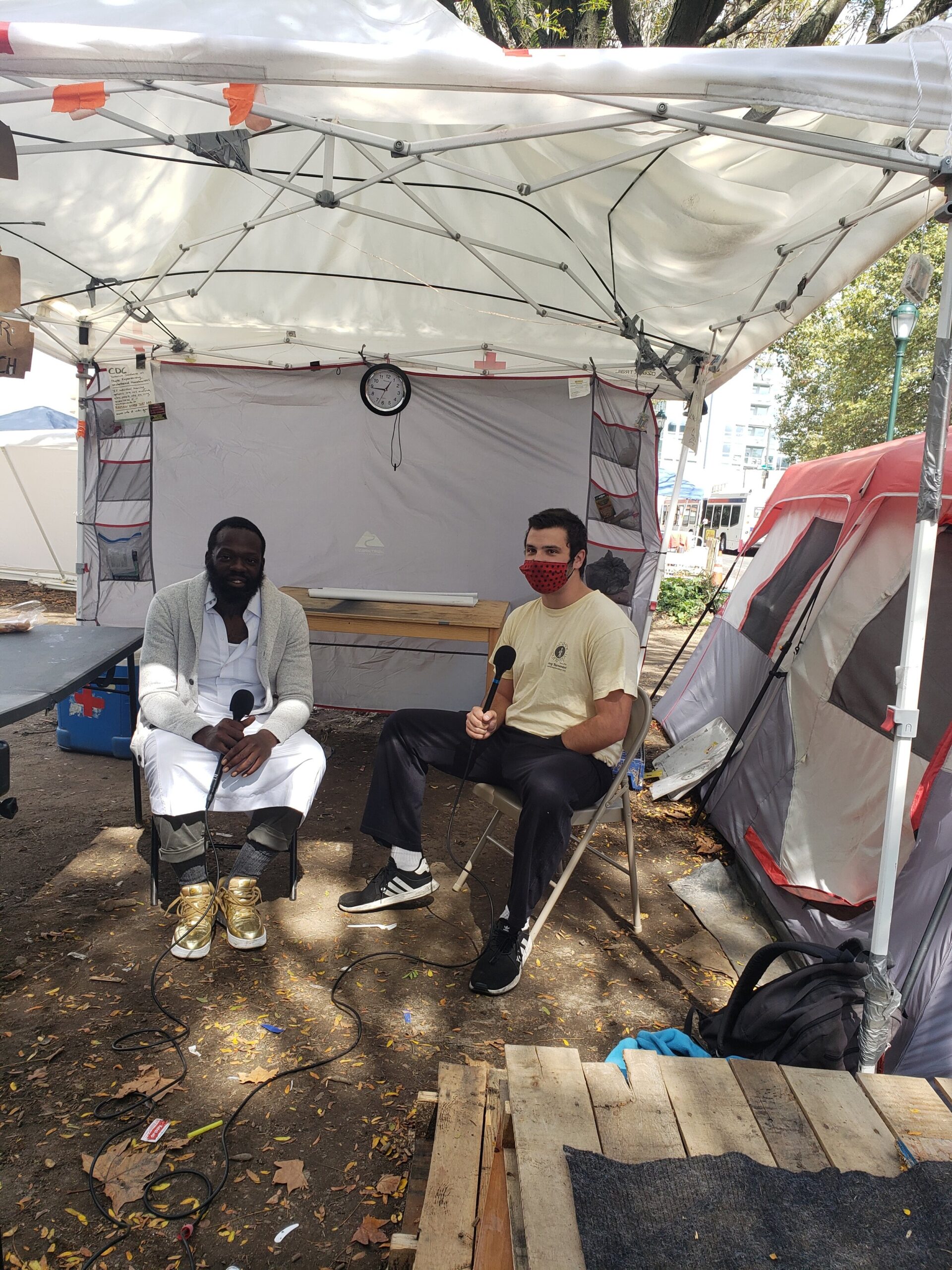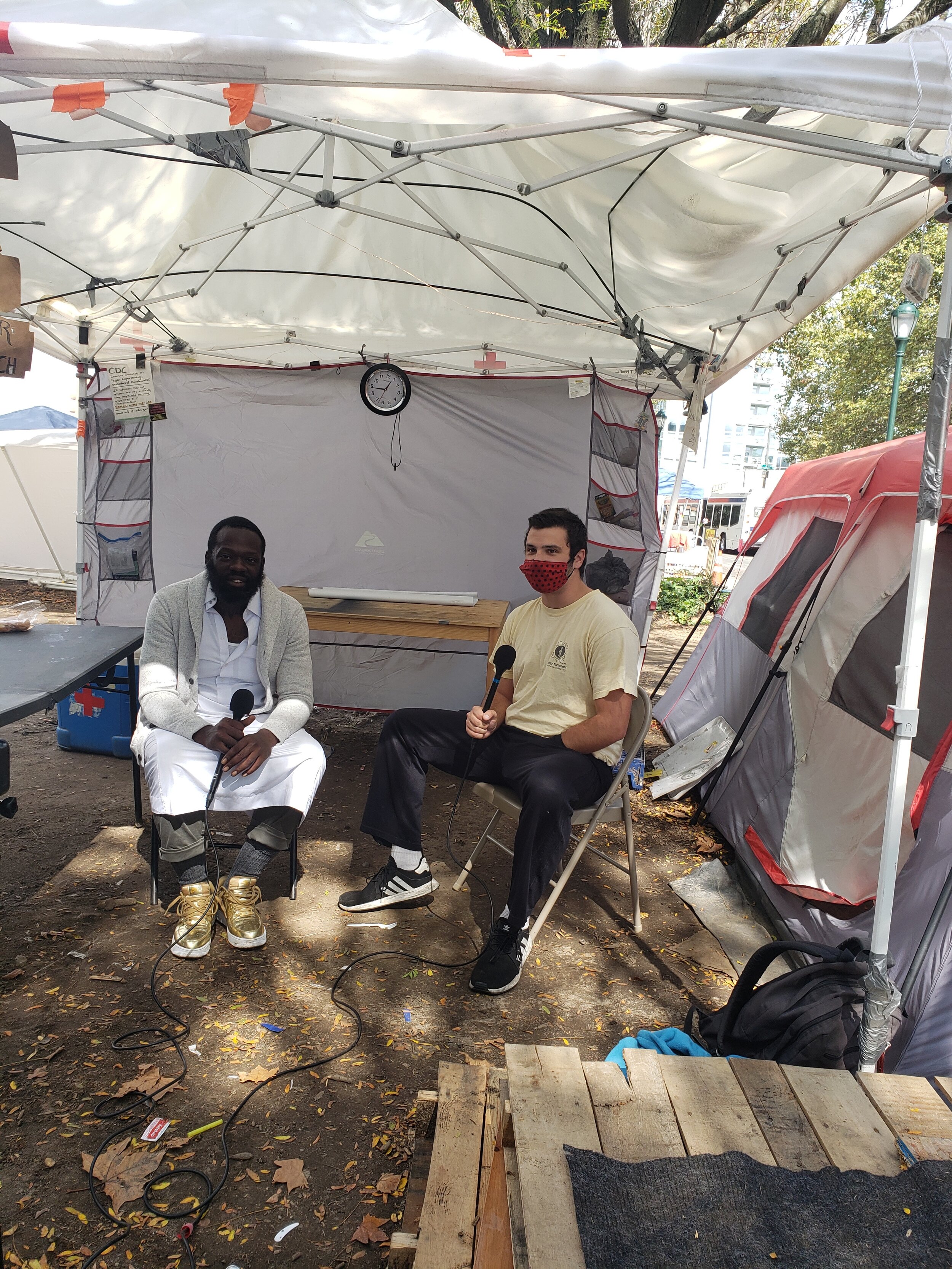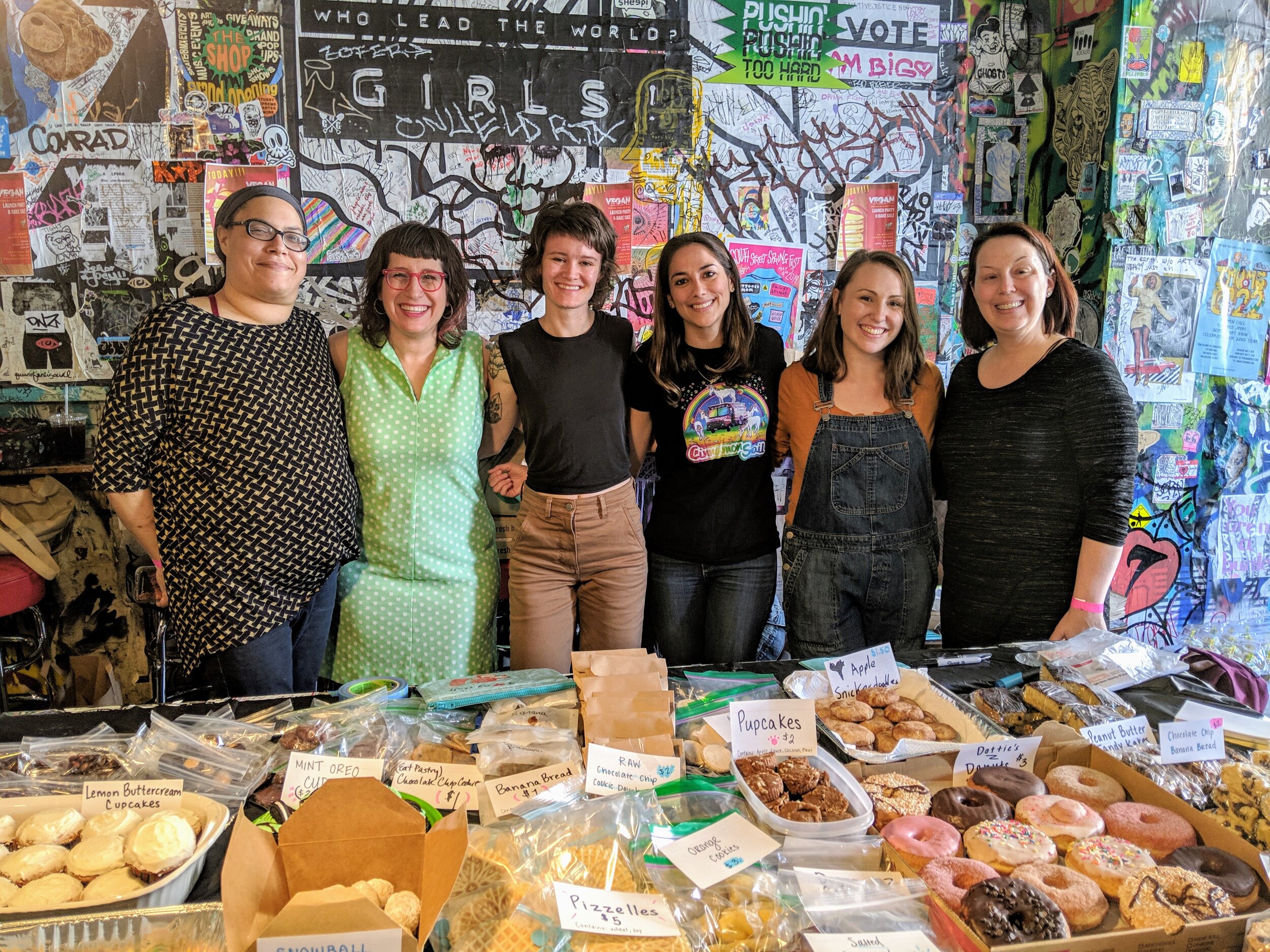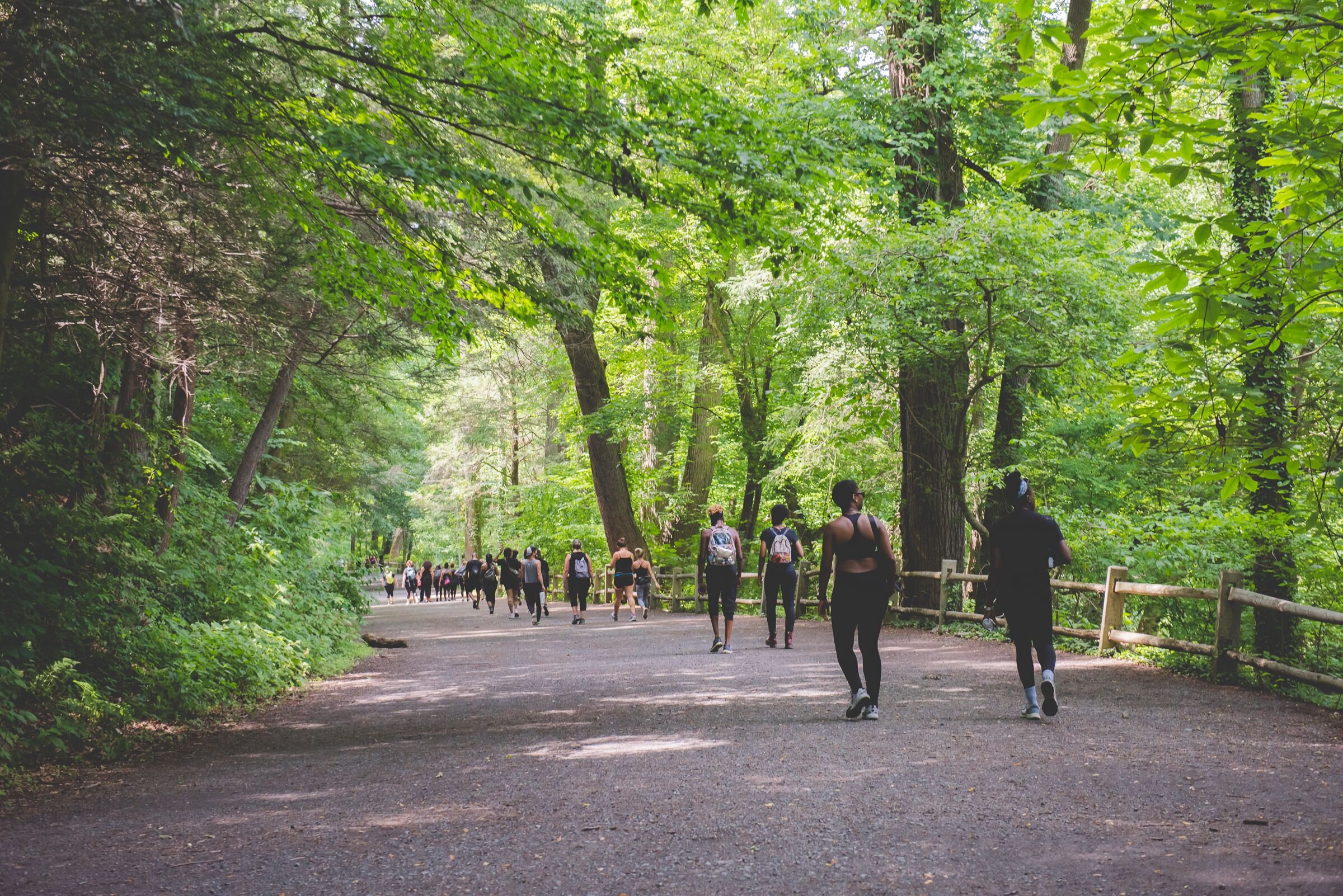On Tuesday night, it was announced that an agreement was reached between the City of Philadelphia and the residents of Camp JTD, which formed at 22nd street and the Benjamin Franklin Parkway in early June. The City has promised residents of the encampment 50 houses in a land trust.The move-in process will take place after the paperwork establishing the land trust is filed through the State.
The deal also includes the development of two tiny house villages, nine bedrooms available for individuals and five bedrooms (one house) for a family, under their existing Shared Housing Initiative program, plus 50 new rapid rehousing opportunities.
Grid spoke with residents of the camp about their experiences and the steps they’re hoping to see taken before its disbanding. Our third interview, transcribed below, was with a camp resident named Kane.
Voices From the Encampment is a series of interviews with Camp JTD residents and affiliated activists about the tentative housing deal being forged with the city. The following interview is the third in a series of six. It has been edited for clarity and style.
Welcome. My name is Jason Peters. I’m a freelance journalist here for Grid Magazine at the James Talib-Dean homeless encampment. Here I am with Kane. Kane, how are you doing today?
I’m good, man. It’s a good day.
How long have you been here at the camp?
I’ve been here since mid-June, so probably like a week, week and a half after they opened the encampment.
How did you hear about the encampment at first?
The encampment is pretty much a community of people who knew each other through circumstances anyway. A lot of people, we’ve been homeless together, in jail together. I came home from prison. This is kind of like the center of everything. Normally, when somebody comes home from prison in Philadelphia, they always wind up down here. Even trying to find a job. I landed here not having nowhere to go. You roam when you do your little odd jobs here and there, but I got six kids, I support six kids. So whatever money I generate out here, it goes to taking care of my kids.
It’s hard to find a place to live on next to nothing income, so I’m down on 15th Street, sleeping like a lot of us do. Somebody tapped me like, “yo bro why are you sleeping on the ground? You know, they got a home up the street?” I don’t know if we can cuss, but when he told me, I told him he was bullshitting. If you bleep it out, I’m sorry.
So you didn’t even believe that this was here?
No. I’d seen it occupied, so I knew it wasn’t impossible, because it’s happened that fully before, but I was like, nah, you lying. So I came up, checked it out, it was legit.
So do you prefer this? Is this your first bout of homelessnes, or have you been homeless in the past?
Yeah, I’ve been homeless in the past. But not this long.
Not this long?
Yeah, not this long. So it was like, COVID slowed a lot up. I didn’t qualify for any of the benefits that were being given out. So it just was like, I’m one in probably the only few really [who] was out here like this, really working. During the whole pandemic.
So you work?
Yeah, I do.
Where do you work at?
A political nonprofit named One PA.
Do you feel safer here? Why have you stayed here?
I definitely feel safer. I’ve been in shelters, hospitals, and other institutions. When you’re so used to institutions, you don’t like being controlled. And when you go into shelters, they control everything about what you do, how you live, and sometimes it’s not adequate living. You might go into one shelter, they might be infested with bugs, another one… I was actually staying at this shelter probably like a year ago, somebody got stabbed to death. Yeah, so it’s gotten crazy.
How much do you know about the 50 house agreement with the city?
I mean, I’ve actually been a part of the negotiation since square one. I’m gonna keep it real. Everybody out here, we knew each other for some time, and I guess they trust my judgment when it comes to the well being of people, because we’ve been out here for so long together. So they entrust me with their well being. When they had a little process of who they wanted to involve, making sure the housing went through, I was one of the names that all the residents [said].
Did you, did you meet any politicians or talk with any?
Not concerning this situation. I work with a political nonprofit, and housing has been the issue that every politician promises they’re pounding the concrete [on]. So I did get to speak to Councilwoman Kendra Brooks actually about housing, not about this actual encampment. She has been down here to visit the encampments. So she’s probably one of the elected officials who’s tuned in to what’s going on at ground level.
Do you think that the 50 houses are actually going to get delivered?
I mean, I’m gonna be honest, right? The beginning of the negotiations, they offered us 15 houses. It’s almost 200 people sleeping now here, bro. There’s no way 15 is an adequate number. For real. For real, 50 is not an adequate number. For real. We talkin’ about comfortably housing hundreds of people. And then they went up to 25. There’s like no way in the world we’re taking 15 houses. They shoot up the number to 25. We’re like, “oh, no, they playin’!” Because for real for real, we know how many properties, like I’ve been scouting properties. And we’ve seen over 50 properties already in the last three, four days of just scouting properties since this negotiation’s been going through. So we shoot a counter-offer for 150 houses.
You shot an offer for 150 houses?
Yeah for 150 houses. In hopes that, at least for them to meet us at half, at 75. Cuz we felt like 75 was a safe number to say, if we acquired 75 homes at this present time, we at least have enough for the elderly, those with mental health [issues]. Because you got to keep in mind, nobody keeps in mind about what type of traumas people go through out here. So we’re dealing with people with drug addiction, mental health issues, all types of stuff that we got to take in consideration when we’re housing people. So we asked for 150 in hopes to get 75. They ended the phone call. The Housing authority ended the phone call when we shot 150. They said no way, end of the world, we’re giving you 150 houses, hung up the phone, and we thought negotiations were over. So you know, we run back, we’re planning protests now, like, what are we gonna do [with] the protesters. Because they hung up the phone and it’s clear they don’t want to give us what we asked them for.
We had the streets barricaded, they came down. So I guess it was a nuisance to whatever is going on between this block and this block… The 50 houses was the reason 22nd Street got freed up.
So, they agreed?
They offered. They hung up the phone and they called randomly like a day and a half later with the offer for 50 houses, but they wanted the promise that the barricade would come down. So we took the barricade down in good faith that they’re gonna at least deliver that. Because at least with the 50 houses we can house, like I said, we got elderly residents, we got mental health residents, we got even residents here who bring their kids out here from time to time because they can’t find housing, or in the shelter they don’t feel comfortable.. So yeah, we are hoping for it even though we, as residents, activists… we don’t even feel like it’s the adequate number. I mean, at the end of the day, they’re gonna make it hard for you, they always do.
Is there anything that you think that people should know about the encampment?
One thing I think everybody should know just about the encampment itself: the encampment is here not just for homeless people. The encampment is here for anybody who has a housing issue. This is a protest surrounded by every housing issue in Philadelphia: gentrification, they’re buying out our neighborhoods, developers are buying out our neighborhoods, we can’t afford to live in the neighborhoods we grew up in. This is for every man and woman who lost their job during the pandemic and can’t afford to pay their rent, and their landlord’s trying to push them out of housing. This protest is beyond people being homeless because housing issues extend [past] homelessness, you feel me?
So if I could say anything about the encampment it’s that we are a community. We’re a self governed community. It’s beautiful. I don’t believe there’s ever going to be a protest as beautiful as this in Philadelphia.
You guys built a whole community
And the people did it! Like, nobody came. All this was ingenuity from people! Like, people who live out here, they built the water system. A Shower, bro. I never thought I’d see it. I didn’t think it was possible.
They made plumbing! I don’t think that gets talked about enough.
But you want to know what’s so crazy? The thing about just the way people program nowadays, to me it’s like, if you were speaking about it in a bad light somebody would have had the most to say about it. But since you were speaking about it in a good light, nobody wants to entertain it. Seems like how media is driven nowadays, if it’s not controversy behind it…
Is there anything you want people to know?
Anyway y’all can support us, we’re on 22nd and Benjamin Franklin Parkway. We take donations but we really need people power, you feel me? That’s the most important thing. A lot of people overshadow the fact that we really need the people to show up for us. Bringing donations, that’s great, but we don’t want to get comfortable. The message to the government is not to get comfortable. It’s to make noise about what’s going on and get attention. So if I can say anything, bring yourself with your donations. Bring you with your donations, because we need you more than we need your things.
Thank you for the interview.
Thanks, bro. I appreciate y’all for coming out and talking to us.










